Intel Core i9-13900K and i5-13600K Review: Raptor Lake Brings More Bite
by Gavin Bonshor on October 20, 2022 9:00 AM ESTCPU Benchmark Performance: Simulation
Simulation and Science have a lot of overlap in the benchmarking world. The benchmarks that fall under Science have a distinct use for the data they output – in our Simulation section, these act more like synthetics but at some level are still trying to simulate a given environment.
In the encrypt/decrypt scenario, how data is transferred and by what mechanism is pertinent to on-the-fly encryption of sensitive data - a process by which more modern devices are leaning to for software security.
We are using DDR5 memory on the Core i9-13900K, the Core i5-13600K, the Ryzen 9 7950X, and Ryzen 5 7600X, as well as Intel's 12th Gen (Alder Lake) processors at the following settings:
- DDR5-5600B CL46 - Intel 13th Gen
- DDR5-5200 CL44 - Ryzen 7000
- DDR5-4800 (B) CL40 - Intel 12th Gen
All other CPUs such as Ryzen 5000 and 3000 were tested at the relevant JEDEC settings as per the processor's individual memory support with DDR4.
Simulation
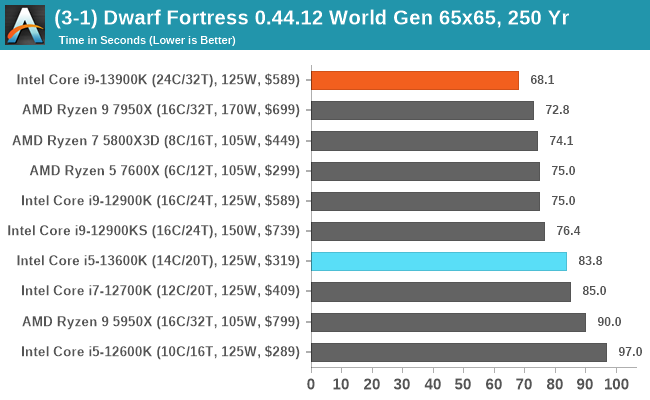
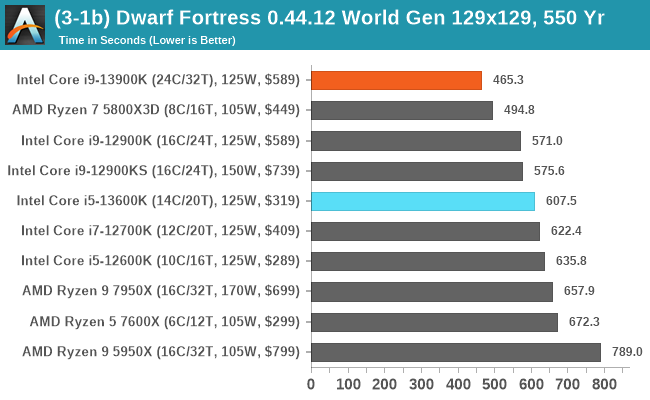
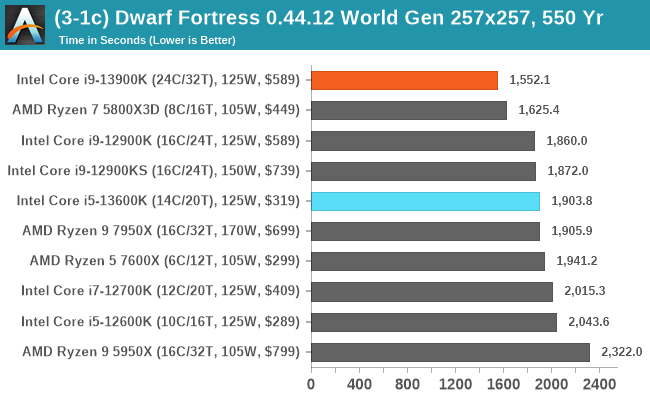
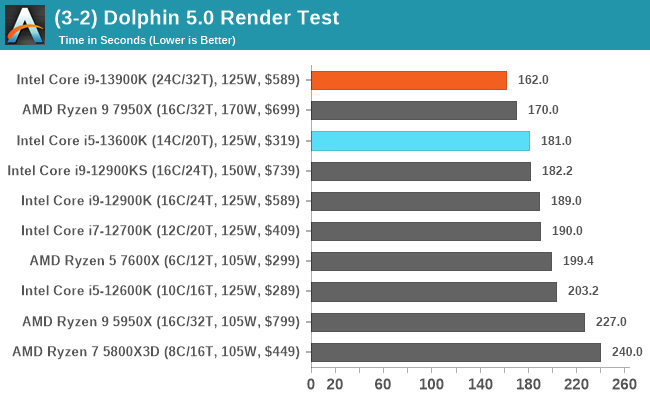
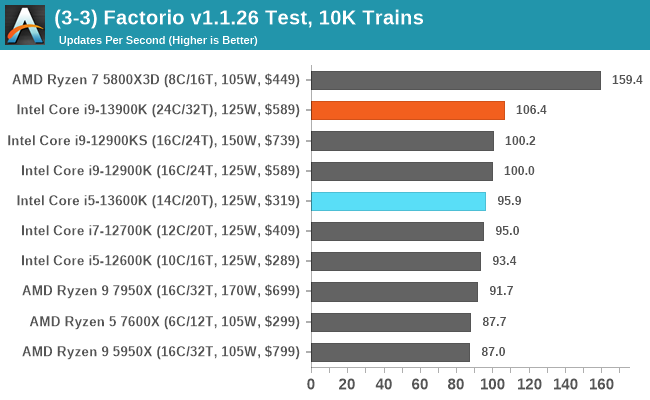
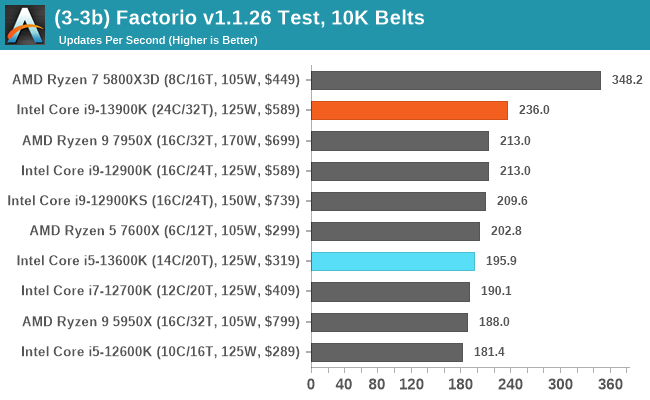
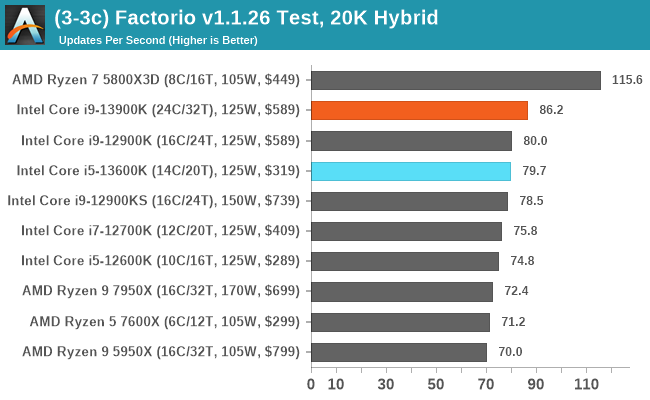
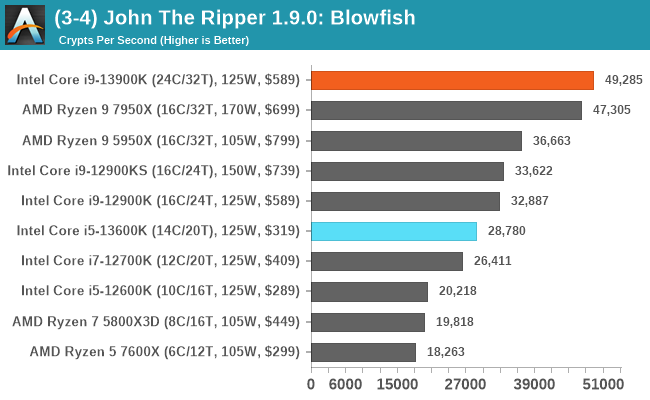
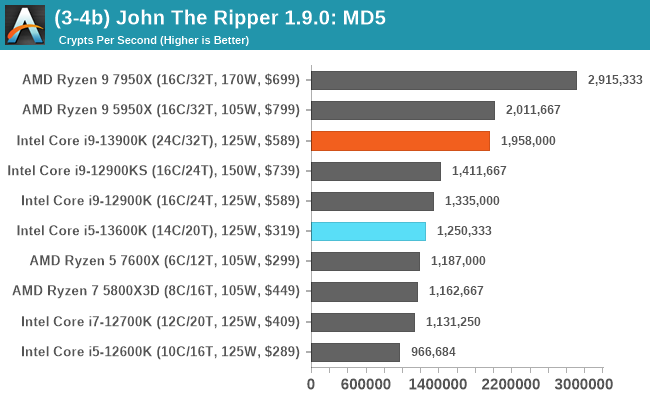
Outside of the AMD Ryzen 7 5800X3D's dominance in our Factorio testing, the rest of the results paint an interesting picture; the Core i9-13900K excels in simulations. Whether that's the addition of eight more efficiency cores over the Core i9-12900K, or that it's also partly due to increased core clock speeds, if it works, it works. The AMD Ryzen 9 7950X is also a solid contender, however, and it tears the competition a new one in our new John the Ripper MD5 test.










169 Comments
View All Comments
adenta180 - Friday, June 23, 2023 - link
Did you guys ever get to the bottom of this SPECint rate GCC regression on 13900K? ReplyAvalon - Friday, October 21, 2022 - link
I think it's starting to become a little disingenuous to list the default TDP in the benchmarks, when it's become increasingly obvious over the past few generations that Intel chips run nowhere in the stratosphere of those TDPs.When you see a "125W" $589 chip virtually tied with a "170W" $699 chip it makes it seem like Intel is a no brainer. Might be time to start putting actual power draw in each of the tests in there, or simply leave stock TDP out, because listing a Core i9 at "125W" when it's running 50-100W higher than an equivalent AMD chip doesn't make much sense any longer. Reply
WannaBeOCer - Friday, October 21, 2022 - link
Did you even read the article? Intel advertises the 13900k as a 253w chip. It drew 32% more than it advertised while AMD advertises its 7950x as a 170w and it drew 30% more than they advertised. On all of Intel’s slides“Processor Base Power
125 W
Maximum Turbo Power
253 W” Reply
bcortens - Saturday, October 22, 2022 - link
Doesn’t matter if they advertise it. The charts are misleading because the W number at the left of the chart has nothing to do with the power consumed to get the performance indicated in the chart.They should really just leave the W number off or show a measured average W required to complete the test. Then the number would have meaning. As it stands, for the purposes of the graph, the number doesn’t mean much. Reply
Avalon - Friday, October 21, 2022 - link
And, to be fair to Intel, why are some of the IGP gaming benchmarks only showing the 12th and 13th gen Intel vs AMD APUs? There's really nothing to be gleaned from this; of course APUs will be faster in IGP tests. If you can't do like for like, then either just publish the Intel scores or don't publish at all. ReplyIketh - Friday, October 21, 2022 - link
In your closing comments about power consumption, I was reminded about the AMD article that compared the performance difference between 230W and 65W. I think you should also mention that in this article. I'm holding out for AMD mobile parts. Those laptops will be nice. ReplyIketh - Friday, October 21, 2022 - link
125W on Intel 7 process, when it's actually 325W on 10nm lmao... pure marketing ReplyWannaBeOCer - Friday, October 21, 2022 - link
Did you even read the article? Intel advertises the 13900k as a 253w chip. It drew 32% more than it advertised while AMD advertises its 7950x as a 170w and it drew 30% more than they advertised. On all of Intel’s slides“Processor Base Power
125 W
Maximum Turbo Power
253 W” Reply
bcortens - Saturday, October 22, 2022 - link
Reviews shouldn’t care about the advertised power, or what it says in the bios when you set the “limit” to 65 watts, reviews should actually measure and report the real power draw.We don’t read reviews to read intel and amd marketing numbers, we want to know the real numbers for a given workload Reply
Iketh - Sunday, October 23, 2022 - link
what on earth does that have to do with my statement Reply